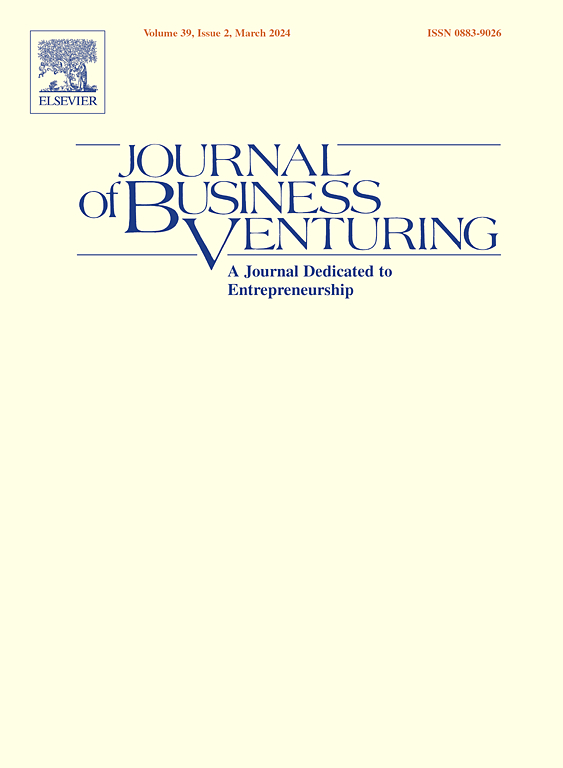The long run gender origins of entrepreneurship: Evidence from Australia's convict history
IF 8.9
1区 管理学
Q1 BUSINESS
引用次数: 0
Abstract
This paper explores the long-run gender origins of entrepreneurship. We argue that present-day propensity for entrepreneurship among men will be higher in neighbourhoods which had historically high sex ratios. We propose that high sex ratios generate attitudes and behaviours that imprint into cultural norms about gender roles and that transmission within families, at school and via shared remembrance create hysteresis in the evolution of these gender norms. To empirically test the theory, we employ the transport of convicts to the British colonies of New South Wales and Van Diemen's Land in the eighteenth and nineteenth centuries as a natural experiment to examine the long-run effect of cultural norms about gender roles on entrepreneurship in present-day Australia. We use a representative longitudinal dataset for the Australian population that provides information on the neighbourhood in which the participant lives, which we merge with data on the sex ratio in historical counties from the mid-nineteenth century. We find that men who live in neighbourhoods that had high historical sex ratios have a higher propensity for entrepreneurship. We present evidence consistent with transmission of cultural norms within families and schools, as well as via shared remembrance in neighbourhoods that had high historical sex ratios being likely persistence mechanisms.
创业的长期性别起源:来自澳大利亚罪犯历史的证据
本文探讨了创业的长期性别起源。我们认为,在历史上性别比例较高的社区,当今男性的创业倾向会更高。我们认为,高性别比例产生的态度和行为会影响到性别角色的文化规范,而这种态度和行为在家庭、学校和通过共同记忆的传播会在这些性别规范的演变中产生滞后。为了对这一理论进行实证检验,我们采用了18世纪和19世纪将囚犯运送到新南威尔士州和范迪门斯地的英国殖民地作为自然实验,以检验关于性别角色的文化规范对当今澳大利亚企业家精神的长期影响。我们使用了具有代表性的澳大利亚人口纵向数据集,该数据集提供了参与者居住的社区的信息,我们将其与19世纪中叶以来历史上各县的性别比例数据合并。我们发现,居住在历史上性别比例较高的社区的男性创业倾向更高。我们提供的证据表明,文化规范在家庭和学校内的传播,以及通过历史上性别比例较高的社区的共同记忆,可能是持续机制。
本文章由计算机程序翻译,如有差异,请以英文原文为准。
求助全文
约1分钟内获得全文
求助全文
来源期刊

Journal of Business Venturing
BUSINESS-
CiteScore
16.70
自引率
6.90%
发文量
59
审稿时长
77 days
期刊介绍:
The Journal of Business Venturing: Entrepreneurship, Entrepreneurial Finance, Innovation and Regional Development serves as a scholarly platform for the exchange of valuable insights, theories, narratives, and interpretations related to entrepreneurship and its implications.
With a focus on enriching the understanding of entrepreneurship in its various manifestations, the journal seeks to publish papers that (1) draw from the experiences of entrepreneurs, innovators, and their ecosystem; and (2) tackle issues relevant to scholars, educators, facilitators, and practitioners involved in entrepreneurship.
Embracing diversity in approach, methodology, and disciplinary perspective, the journal encourages contributions that contribute to the advancement of knowledge in entrepreneurship and its associated domains.
 求助内容:
求助内容: 应助结果提醒方式:
应助结果提醒方式:


